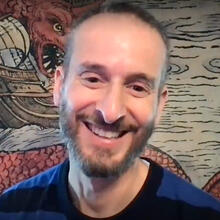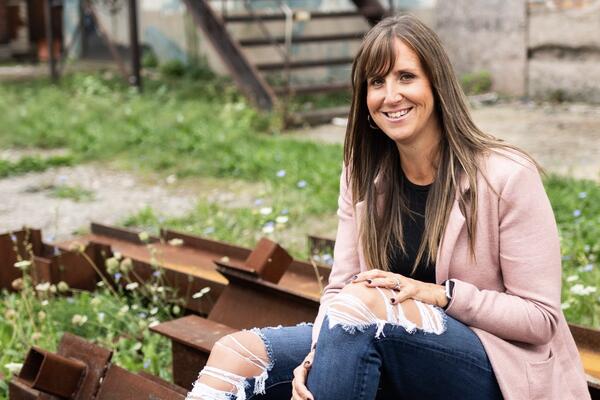
Making films with Disney and Netflix
We chatted with director and screenwriter Chris Williams (BA ’91 Fine Arts) about all things animation and storytelling

We chatted with director and screenwriter Chris Williams (BA ’91 Fine Arts) about all things animation and storytelling
By Olivia Vanderwal Faculty of ArtsIf you don’t recognize his name, you’ll probably recognize some of the movies Chris Williams played a key role in creating. From voicing Oaken in Frozen to writing for Mulan to directing Big Hero 6, Chris has acquired a long list of film credits since studying Fine Arts at the University of Waterloo. Most recently, he wrote, directed and produced The Sea Beast for Netflix, which was nominated for Best Animated Feature at this year’s Oscars.
The 2023 Arts Alumni Achievement Award winner joined the university community on Tuesday, September 26 for an online Q&A, hosted by Mike Farwell (BA ’97). Keep reading for some highlights from their conversation.
As a creator of so many highly successful films, what would you say are the key ingredients to engaging and delighting a diverse audience today?
“There’s a tension between setting up expectations … and having enough that is fresh, surprising and unexpected. You're trying to find that balance between the familiar and the unfamiliar. And I think at the same time, there's also a tension between the universal and the specific when we're talking about our stories, our characters and our themes. We want them to be universal enough that most people will see themselves in that story and be able to connect with and relate to it. At the same time, you don't want to tell such a generic story that it lacks any specificity of character and place. So you’re trying to walk a line between the familiar and the unfamiliar, the universal and the specific.”
You worked at Disney for 25 years and then moved to Netflix in 2018. By this point in your career, you have obviously played multiple roles in the creation of these animated features. Could you talk a bit about a role that you're especially excited about?
 “Ultimately the thing that I love most about my job and really appreciate about animation is the fact that it's such a collaborative art form…. I love that when it comes to animation, no one person can actually tell you how an animated movie gets made. We are so deeply dependent on each other, and I think if you embrace that, if you understand that we're all going to be stronger if we work together and collaborate – and real collaboration, which involves honesty and at the same time respect for each other's points of view – if you can really find that place, then you will ultimately be able to make the best possible version of the film. So I think as far as the role that I that I value the most, I would say it's contributing to a collaborative environment.”
“Ultimately the thing that I love most about my job and really appreciate about animation is the fact that it's such a collaborative art form…. I love that when it comes to animation, no one person can actually tell you how an animated movie gets made. We are so deeply dependent on each other, and I think if you embrace that, if you understand that we're all going to be stronger if we work together and collaborate – and real collaboration, which involves honesty and at the same time respect for each other's points of view – if you can really find that place, then you will ultimately be able to make the best possible version of the film. So I think as far as the role that I that I value the most, I would say it's contributing to a collaborative environment.”
Could you share with us an experience from your personal or professional life that you would say has been critical to your success?
“As far as my career goes, I think one of the things that I most benefited from was actually turning down an opportunity early in my career…. There was a moment where [Disney] offered me a job as the head of story, and at the time I told them, no, I didn't want to. I wasn't ready. I didn't feel that I was good enough as a story artist to be in a position of looking at other people's work and starting to critique it and giving that kind of feedback. I still had so much to learn, and I still do…. And I think that was actually an important thing because it was in keeping with my general philosophy. I've never really had a grand design for myself, for my career. I didn't envision becoming a director necessarily. I just wanted to work hard on good movies with interesting people and get better at what I do, and everything was ultimately a just a by-product of that.”
What are your biggest obstacles between idea and film release, and how do you overcome those obstacles?
“The advice I give oftentimes to people who are struggling to get something off the ground is, I say again and again, show it to people. Have the courage to show something that you feel is incomplete, show something that you don't feel 100% great about…. Maybe you don't have the whole story figured out. Maybe you don't know how to execute it. Maybe you feel like things in your story or your animation aren't working, but if that prevents you from showing it to people and engaging and asking for feedback, then that's where it dies. Have the courage to show something that isn't great yet. That's going to be the way to move forward.”
You were a Fine Arts major at the University of Waterloo and then studied animation at Sheridan College. How would you say studying Fine Arts in addition to animation gave you an edge in the industry?
“I did enroll at Sheridan College straight out of high school initially. But when I got there, I realized that it wasn't the right time for me. I needed that broader education – I needed to learn the fundamentals of art, and I wanted to learn more about art history and just to have that richer arts experience…. I would say that the years that I spent studying Fine Arts helped bolster and improve my portfolio and was ultimately a big part of the reason why I was accepted into the Disney internship in the first place…. I do believe in what post-secondary education and a place like the University of Waterloo has to offer. And I know that it's had a big bearing on me and who I am and what I do for a living.”

Read more
Q and A with Sara J. Cumming (PhD ’14 Sociology) Executive Director of Home Suite Hope, and the Faculty of Arts 2023 Rising Star Alumni Award recipient

Read more
Sam Spizzirri (BA '19) found a sense of belonging and self in the Sexuality, Relationships, and Families program. Inspired by that experience, they pursued a career in advocacy.

Read more
Named in Forbes Africa’s 30 under 30, Lehlé Baldé's shining media career is inspired by her grandmother, a journalist in 1960s Senegal.
The University of Waterloo acknowledges that much of our work takes place on the traditional territory of the Neutral, Anishinaabeg, and Haudenosaunee peoples. Our main campus is situated on the Haldimand Tract, the land granted to the Six Nations that includes six miles on each side of the Grand River. Our active work toward reconciliation takes place across our campuses through research, learning, teaching, and community building, and is co-ordinated within the Office of Indigenous Relations.